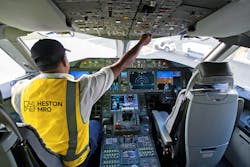Heston MRO is one of the largest independent MROs in Australasia, with an airside presence in Brisbane, Sydney, Melbourne, Perth, Adelaide and Wellcamp, among others.
They provide full range of scheduled and unscheduled line maintenance, AOG recovery, engine on wing services, aircraft parking and storage solutions, consumables, components, materials and logistics support services.
“We are a team of more than 140 people now, growing and developing together with our global and local customer base, investing in the capability and training to support the latest aircraft technology platforms, – and also in components, materials and warehouse solutions.
“With utmost focus on safety and quality, Heston MRO team is guided by our values to achieve strategic goals in line with the company’s mission and vision,” said Asta Zirlyte, CEO of Heston MRO.
Previously, the MRO was known as Aircraft Maintenance Services Australia when it was established in 1992 to provide line maintenance services to international airlines. In 2007 the business became a division of SIA Engineering Company and continued to provide high quality standard line maintenance services to Singapore Airlines and other international carriers. Then in 2018, the company was acquired by Heston Aviation with the goal of being developed into a truly independent and agile one-stop MRO service provider in Australasia.
Digitalization
More recently, Heston MRO has been embarking on its digital transformation journey. It devised a plan to increase the company's level of digital maturity, which included adopting advanced cloud technologies that not only improve operational processes but also boost collaboration within the organization. With new technologies, implementation of best practices in cybersecurity remains one of the company's top priorities.
“Digital and application-driven user-friendly processes are making their usefulness more and more appealing as costs are on the rise,” Zirlyte said. The thought is to simplify and make the processes lean – without jeopardizing the safety and/or compliance, reduce duplication, increase efficiencies, and share common knowledge across a single platform, she said.
Digitalization of MRO industry is becoming increasingly popular and is even more important in the context of staff shortages, she added.
“Without going into great detail about several other projects, like the implementation of IFS as the main ERP system and the replacement of the network's hardware, Heston's CASA Part 147 technical training school has upgraded its Learning Management System software to the best-of-breed web-based system, which will provide users with a much better user experience and enable the safe and secure management of training notes and exams,” said Zirlyte.
Aircraft and Opportunties
The MRO has also appointed a dedicated engineering training manager to manage and develop its in-house training capabilities to cater to the wide variety of new generation aircraft.
“Heston MRO already has B787 engines differences, B737MAX full type and conversion from NG, A320 differences CEO to NEO and similar courses in line with aviation industry’s development. New airplane types such as the A350 full type course, A330NEO were already submitted to CASA for an approval which is expected by Q4, 2022. This ensures its staff are trained in the very latest the aviation market is bringing to our shores.
Another recent project at Heston MRO has been the launch of Engines On Wing services, which started with mobile borescope service and is now being developed into a more robust engines solution for airlines, leasing companies and OEMs, Zirlyte explained.
When all these parallel initiatives mature, she said Heston MRO will be a full-range one-stop shop independent MRO provider in Australasia with the wide scope of MRO services, differentiated through technology and efficiency.
Zirlyte describes business today as challenging but interesting, with many business opportunities that would never have appeared during good and smooth times.
“Each crisis and industry shock is providing opportunities – we are keen to explore each and every one of them,” she said.
Heston MRO entered the COVID-19 pandemic with a business structure fully focused on international air traffic entering Australia. With Australian international and interstate borders closed, they didn’t have much space to derive any meaningful revenue from the incumbent business. Those years, 2020 and 2021, were the most trying years in the company’s 30-year history.
“Heston MRO team decided to pivot dramatically and focus on grounded aircraft around Australia and within our region, offering short-term and long-term aircraft parking and storage solutions, engine removal and installation, borescope inspections, etc. while servicing the growing cargo operation within the network of our stations,” Zirlyte said.
At the same time, Heston expanded their B737NG engineer pool and made investments in tooling to focus on domestic customer Regional Express in their initiative to operate B737s on Australian East Coast trunk routes.
“It is a challenge given the size of market and the competition in Australia, in the region and globally,” Zirlyte said of the current climate of the aviation industry. “The sudden upswing of the aviation -ndustry in the post-COVID (pandemic) era has seen a rapid increase in the flights and movement around the country. These challenges are further compounded by the shortage of skilled labor as all the companies gear up their activities.”
Heston MRO is, like many others, is struggling with staffing issues.
“The supply of trained and skilled staff has been uppermost in our minds. Increasing the capability of our in-house P147 and also P145 technical training school is one way of upskilling those whom we already have while we engage in manpower resources search locally and abroad and also attracting young, inexperienced people, projecting individual career plans and building competencies skill set as our long-term strategy,” said Zirlyte.
The tight labor market and aging baby boomer workforce is causing a rethink of the benefits of an apprenticeship and training of staff from the ground up, Zirlyte added. Too few people are infused into the workforce as purpose-built engineers and technicians and too much reliance on ready-made employees has caused this skills shortage.
In addition, she said many experienced employees took an early retirement due to COVID, some of them will be leaving the industry in a couple of years’ time.
How to recruit younger workers and bridge the experience gap is a very important topic, which already has been presented to the local governments and unions, she said.
Despite the strain on the labor market for Heston MRO, they see themselves strengthening their footprint in the Australasian region, and globally, in the following ways:
We see us strengthening our footprint in Australasian region and globally though:
The growth of their technical training school capability for internal and external students and organizations.
Expansion of engine on wing services and BSI capability, adding engine off wing capability in a very near future.
Active growth in components business through their daughter company Heston MRO Europe. The company’s presence in Europe provides Heston MRO geographical coverage and brings us closer to the main global markets for components and aviation assets. Through European presence, they are positioned well to capture post-COVID industry recovery and fulfil customer needs for spare parts support, AOG coverage, asset part-outs and trading, warehouse and logistics solutions.
An efficient and modern heavy maintenance facility to secure the heavier tasks to be performed within Australia.
Ultimately, Zirlyte said what helps separates them from the competition is: “Agile, customer-focused, quality and safety-driven, creative with out-of-the-box thinking and solutions, challenging the common historical practices and finding our own views and style within compliance framework.”
About the Author
Walker Jaroch
Editor
Contact: Walker Jaroch
Editor | AMT
+1-920-568-8399
>> To download the AviationPros media kits, visit: Marketing Resource Center
>>Check out our aviation magazines: Ground Support Worldwide | Airport Business | Aircraft Maintenance Technology

